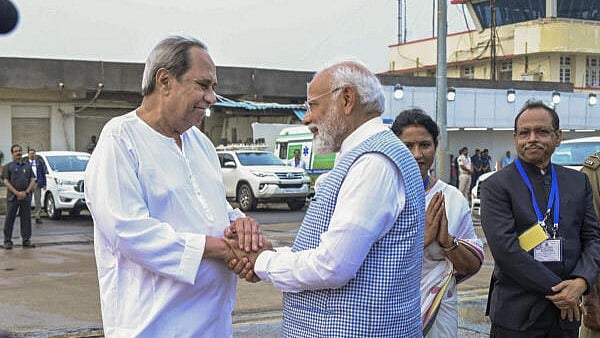
Whatever the compulsions, the BJD and the BJP are not adopting a confrontational approach towards each other. In 2019, both parties had fought the elections attacking each other.
Credit: PTI Photo
Notwithstanding the bonhomie between their top leadership, Odisha’s ruling Biju Janata Dal (BJD) and main opposition Bharatiya Janata Party (BJP) have announced to fight the upcoming simultaneous Lok Sabha and Assembly elections on their own.
The uncertainty that prevailed in the minds of the workers of both parties for more than two weeks ended when the two sides clarified to fight the elections alone, following the failure of talks to contest as an alliance. The reasons behind the two erstwhile partners not agreeing to a tie-up are many.
The BJD was in no mood to allow a greater share of the 147 Assembly seats to the national party because it had won 112 of those seats in the 2019 elections — the BJP won just 23 seats. The BJD registered a landslide victory in the zilla parishad elections and performed exceedingly well in the urban body polls in 2022. The regional party bagged 766 of the 852 zilla parishad seats, while the BJP finished a distant second with just 42 seats.
The BJP central leadership ultimately decided against it, despite its desire to join forces with the BJD to win more Lok Sabha seats from Odisha. It accepted the state unit's position that contesting fewer Assembly seats would weaken the BJP's organisational strength throughout the state.
Also, what prevented both the BJD and the BJP leadership from allying was the thought of allowing the Congress to become the main opposition party in the state before the elections. Although the vote share of the Congress in Odisha has been on the decline, a BJP-BJD alliance could have helped the grand old party to emerge as the principal opposition, a space that the BJP would not have liked to concede.
Further, the BJD and the BJP decided against forming an alliance taking into account the frustration among party workers who have been opposing each other since the BJD broke its alliance ahead of the 2009 elections.
Considering the confrontationist approach of the local party workers, the two parties could have faced resentment at the grassroots level, which, in turn, could have led to aggrieved local leaders contesting as rebels. This could have marred the prospects of the two parties quite badly. The possibility of losing voters’ trust and the fear of largescale desertion of party leaders ahead of the polls also made the two sides reconcile by taking a pragmatic political stand to fight separately.
Whatever the compulsions, the BJD and the BJP are not adopting a confrontational approach towards each other. In 2019, both parties had fought the elections attacking each other.
Since the 2019 polls, the BJD has been supporting the Prime Minister’s initiatives on many issues at the Centre and also appreciating Narendra Modi’s policies on the economic front. Modi termed Chief Minister Naveen Patnaik as a ‘friend’ and ‘popular Chief Minister’ during his two recent visits to the state. Last month, the BJD supported the BJP’s Ashwini Vaishnaw in getting re-elected to the Rajya Sabha from Odisha.
While announcing to fight all the polls separately, the BJP’s state unit made it clear that their main thrust of campaign in Odisha will be Modi’s leadership. The saffron party is also alleging that the Centre’s welfare schemes are not being implemented properly in Odisha, while advocating that a double engine government would ensure Odisha’s faster development.
While declaring to contest under the leadership of their five-time Chief Minister and exuding confidence to win more than three-fourth seats, the BJD has said that it will continue to take decisions in true spirit of ‘co-operative federalism and statesmanship’ required for nation building by keeping people of Odisha and their welfare in the forefront.
A post-poll alliance between the two parties cannot be ruled out if Modi would require the BJD’s support at the Centre, in case the National Democratic Alliance fails to secure a majority in the Lok Sabha.
The BJD appears to be on a better footing with the BJP and the Congress busy fighting for the second spot. The Congress, which remains weak till date, may perform better than the 2019 elections as its appears that the BJP and the BJD are in for a ‘friendly contest’.
(Prafulla Das is a Bhubaneswar-based journalist.)
Disclaimer: The views expressed above are the author's own. They do not necessarily reflect the views of DH.